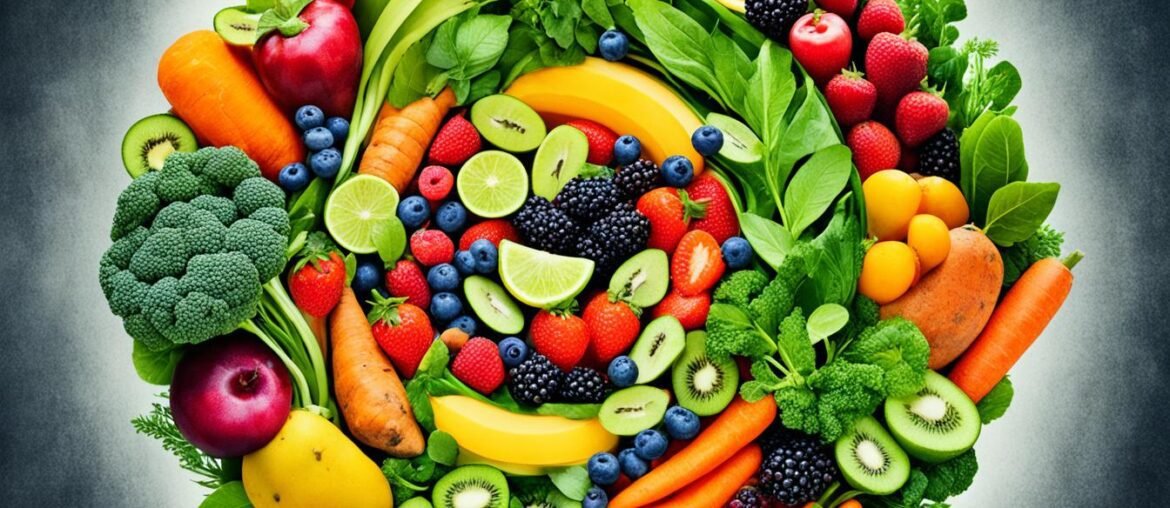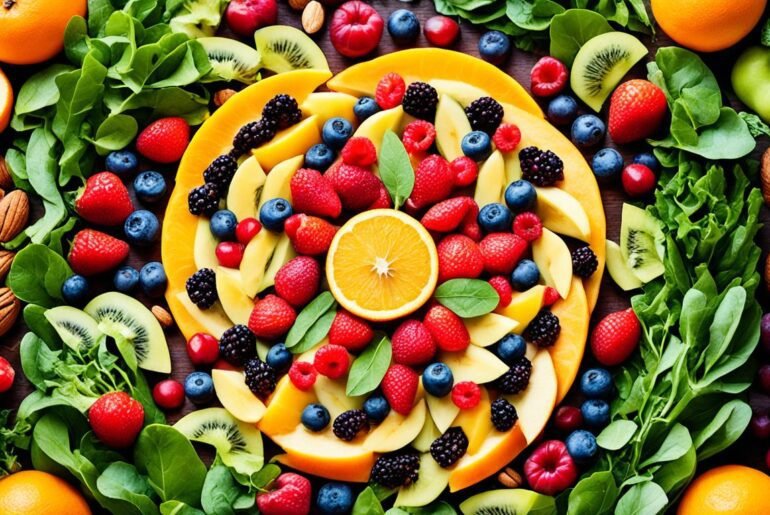Did you know that the foods you eat can significantly impact the aging process of your skin? As we age, our diet plays a crucial role in maintaining the health and appearance of our largest organ. Consuming foods that are rich in antioxidants, healthy fats, and essential nutrients can help prevent skin aging, promote skin health, and enhance overall well-being.
From supporting collagen production to protecting against oxidative stress, the right diet can work wonders for your skin. In this article, I will explore the power of natural diet remedies for skin aging and provide you with valuable insights on how to nourish your skin from within.
- Discover the benefits of vegetables and fruits for youthful skin
- Unveil the power of healthy fats for skin health
- Learn about the antioxidant properties of green tea
- Uncover the potential benefits of dark chocolate for your skin
- Understand the importance of nutrient-dense vegetables and flax seeds for your skin
By incorporating these natural diet remedies into your daily routine, you can take proactive steps towards preventing skin aging and achieving a healthy, vibrant complexion.
Key Takeaways:
- Eating a diet rich in antioxidants, healthy fats, and essential nutrients can support healthy and youthful-looking skin
- Vegetables and fruits such as broccoli, red bell pepper, spinach, avocado, blueberries, papaya, and pomegranate seeds are beneficial for skin health
- Healthy fats found in extra virgin olive oil, fatty fish, flax seeds, and avocados play a vital role in maintaining skin health
- Green tea and dark chocolate contain antioxidants that may benefit the skin
- Including these nutrient-dense foods in your diet can help protect against skin aging and promote overall well-being
The Power of Vegetables for Youthful Skin
https://www.youtube.com/watch?v=5iNHmVIcGP4
When it comes to promoting healthy and youthful skin, incorporating vegetables into your diet is a must. Vegetables like broccoli, red bell pepper, spinach, and sweet potatoes are packed with essential nutrients, antioxidants, and vitamins that can nourish your body and support skin health.
Broccoli, for example, is an excellent source of vitamins C and K, antioxidants, and fiber. These nutrients play a crucial role in collagen production and bone health, helping to maintain the elasticity and overall health of your skin.
Red bell peppers are another vegetable that can work wonders for your skin. They are high in antioxidants called carotenoids, which have anti-inflammatory properties and promote skin health. Including red bell peppers in your diet can help protect your skin from damage caused by environmental stressors.
Spinach is another vegetable that deserves a spot on your plate. It is hydrating and packed with antioxidants and vitamins A, C, E, and K. These nutrients are essential for maintaining skin health and overall well-being. Adding spinach to your meals can help keep your skin radiant and nourished.
Last but not least, sweet potatoes are a great addition to any skincare routine. These root vegetables contain beta-carotene, a precursor to vitamin A. Beta-carotene is known to restore skin elasticity, promote cell turnover, and maintain a youthful appearance. Including sweet potatoes in your diet can contribute to healthy and glowing skin.
By incorporating these vegetable powerhouses into your meals, you can provide your body with the necessary nutrients to support youthful and radiant skin. Let’s take a closer look at the benefits of each vegetable:
| Vegetable | Nutrients | Benefits |
|---|---|---|
| Broccoli | Vitamins C and K, antioxidants, fiber | – Supports collagen production and bone health – Provides antioxidant protection – Supports healthy digestion |
| Red Bell Pepper | Carotenoids, vitamins A and C | – Reduces inflammation and promotes skin health – Protects against environmental damage – Boosts immune system |
| Spinach | Vitamins A, C, E, and K, antioxidants | – Hydrates and nourishes the skin – Promotes collagen production – Supports overall well-being |
| Sweet Potatoes | Beta-carotene, vitamins A and C | – Restores skin elasticity – Promotes cell turnover – Enhances skin tone and texture |
Including these vegetables in your diet can provide your skin with the nourishment it needs to stay healthy, vibrant, and youthful. So, why not add more greens, reds, and yellows to your meals and enjoy the benefits of these vegetable powerhouses?
The Benefits of Fruits for Skin Aging
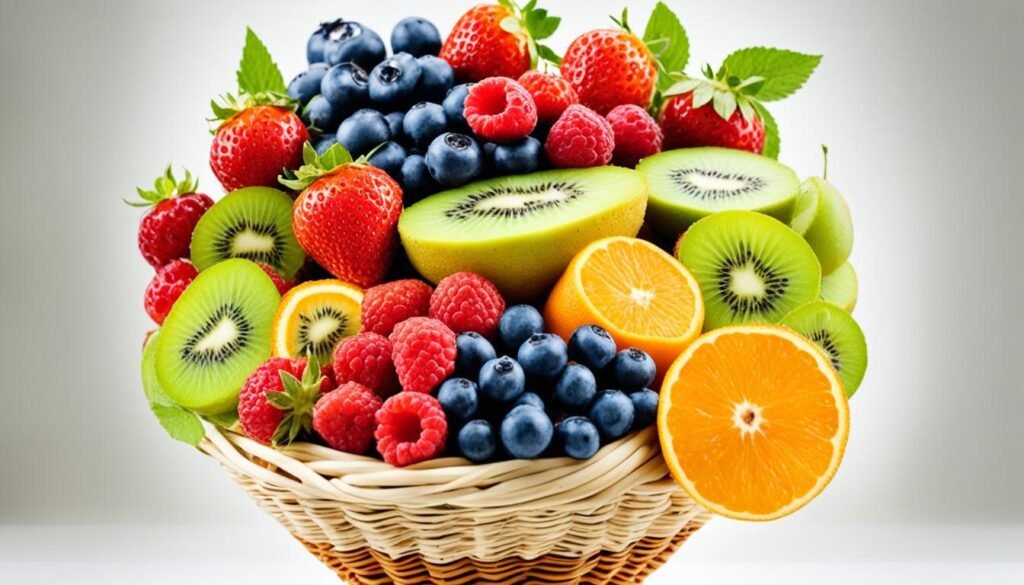
Fruits play a vital role in promoting skin health and slowing down the aging process. Rich in antioxidants, vitamins, and minerals, fruits like avocado, blueberries, papaya, and pomegranate seeds offer numerous benefits for your skin.
Let’s take a closer look at how these fruits can nourish and protect your skin:
Avocado
Avocado is a powerhouse of nutrients that can improve skin health. It is packed with healthy fats, including omega-9 fatty acids, which help moisturize and nourish the skin. Avocado is also rich in vitamins K, C, E, and A, and potassium, all of which contribute to a healthy complexion.
Blueberries
Blueberries are not only delicious but also excellent for your skin. These small berries are loaded with vitamins A and C, as well as antioxidants called anthocyanins. These antioxidants protect the skin from oxidative stress, reduce collagen loss, and shield against sun damage.
Papaya
Papaya is often referred to as a superfood for its numerous health benefits, including skin health. It is rich in antioxidants like vitamins A, C, K, and E, which help combat free radicals, promote skin health, and may even prevent age-related diseases. The natural enzymes found in papaya can also aid in exfoliation, leaving you with a brighter and more youthful complexion.
Pomegranate Seeds
Pomegranate seeds are packed with antioxidants, including polyphenols, that protect the skin against free radicals and UV damage. These antioxidants also stimulate collagen production, promoting a more youthful appearance and improving skin elasticity.
By incorporating these fruits into your diet, you can provide your skin with the essential nutrients it needs to maintain a healthy and youthful glow.
“The benefits of avocado, blueberries, papaya, and pomegranate seeds for skin health are undeniable. Including these fruits in your diet can help nourish your skin from within and slow down the aging process.”
Remember, a balanced diet that includes a variety of nutrient-rich fruits can complement your skincare routine and contribute to overall skin health.
| Fruit | Key Benefits |
|---|---|
| Avocado | Rich in healthy fats, vitamins K, C, E, and A, and potassium. Improves skin health and hydration. |
| Blueberries | High in vitamins A and C, and antioxidants. Protects against sun damage and reduces collagen loss. |
| Papaya | Superfood rich in antioxidants, vitamins A, C, K, and E. Promotes skin health and may prevent age-related diseases. |
| Pomegranate Seeds | High in antioxidants. Protects against UV damage and promotes collagen production. |
The Power of Healthy Fats for Skin Health
When it comes to maintaining healthy skin, incorporating healthy fats into your diet is essential. Foods such as extra virgin olive oil, fatty fish like salmon, flax seeds, and avocados provide a rich source of beneficial fats that can nourish your skin and support overall well-being.
Extra virgin olive oil is not only a delicious culinary ingredient but also a powerful ally for your skin. This oil is packed with healthy fats and antioxidants that can help reduce inflammation and oxidative damage, promoting a healthier complexion.
Fatty fish, such as salmon, offer omega-3 fatty acids, which are known to support a healthy skin barrier. These fatty acids also possess anti-inflammatory properties, helping to decrease inflammation and enhance collagen production, resulting in more youthful-looking skin.
Flax seeds are another excellent source of healthy fats and antioxidants that can benefit your skin. The omega-3 fats and antioxidants found in flax seeds help combat free radicals, protect against skin damage, and support a healthy skin membrane.
Avocados are renowned for their heart-healthy fats, fiber, and nutrient content, but did you know they can also contribute to skin health? The fats in avocados help keep the skin hydrated, promote a healthy skin barrier, and provide essential nutrients for a vibrant complexion.
By incorporating these foods into your diet, you can provide your skin with the nourishment it needs to maintain its health and vitality.
The Benefits of Healthy Fats for Skin Health:
- Reduced inflammation and oxidative damage
- Support for a healthy skin barrier
- Promotion of collagen production
- Protection against free radicals
- Hydration and maintenance of a healthy skin barrier
- Supply of essential nutrients for skin health
Incorporating these beneficial fats into your diet can make a noticeable difference in the health and appearance of your skin. Embrace the power of healthy fats to support your skin’s natural radiance and vitality.
The Antioxidant Power of Green Tea
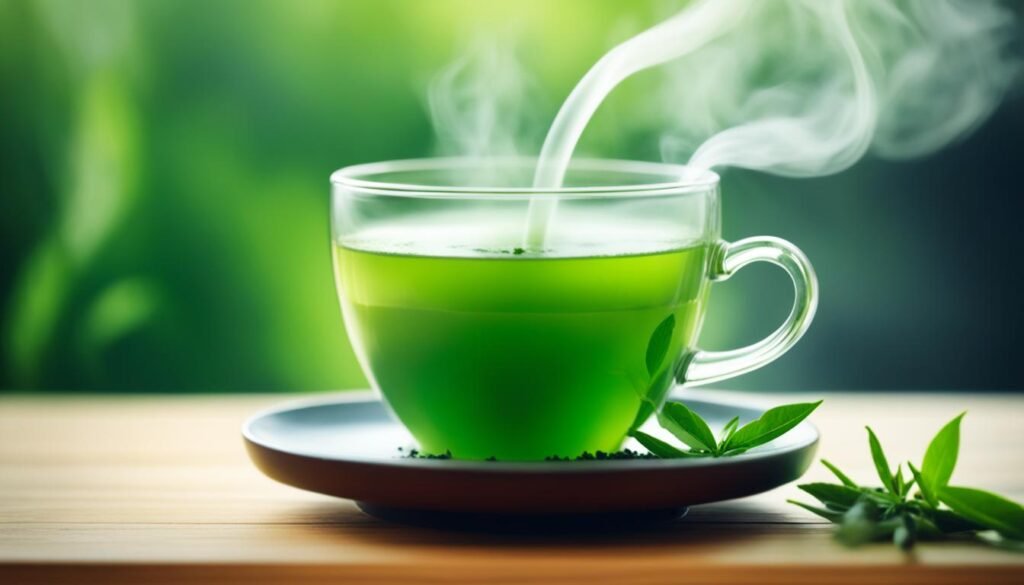
Green tea is a beverage that has been enjoyed for centuries, not only for its refreshing taste but also for its numerous health benefits. One of the key reasons green tea is touted as a superfood is its high antioxidant content, which can have a positive impact on skin health.
Antioxidants, such as polyphenols, play a crucial role in fighting free radicals in the body. These free radicals are unstable molecules that can cause damage to cells and contribute to aging and various diseases. Green tea is particularly rich in a polyphenol called epigallocatechin gallate (EGCG), which acts as a powerful antioxidant.
The antioxidants in green tea help protect the skin from oxidative stress caused by environmental factors like UV radiation and pollution. By neutralizing free radicals, green tea may help prevent cellular damage and reduce the visible signs of external skin aging.
Furthermore, studies have suggested that green tea may have anti-inflammatory properties, potentially reducing redness and inflammation associated with skin conditions like acne and rosacea.
However, it’s important to note that while green tea shows promise in promoting skin health, more research is needed to fully understand its effects on skin aging. It’s always best to consult with a healthcare professional for personalized advice.
The Benefits of Dark Chocolate for Skin Health
Dark chocolate is a delicious treat that not only satisfies your sweet tooth but also offers numerous benefits for your skin health. This decadent treat is rich in polyphenols, which are powerful antioxidants that help fight free radicals in the body. These antioxidants protect the skin from oxidative stress, which can lead to premature aging and damage.
The flavanols found in dark chocolate have been found to have a positive impact on skin health. Research suggests that these compounds may improve skin elasticity, making it more resilient and less prone to sagging. Additionally, flavanols may help reduce the appearance of facial wrinkles, promoting a smoother and more youthful complexion.
Dark chocolate is a delicious way to indulge your sweet tooth while reaping the benefits for your skin health.
However, it is important to note that while dark chocolate offers potential benefits for skin health, more research is needed to fully understand its effects. It is also worth mentioning that not all chocolate is created equal when it comes to skincare benefits. Dark chocolate with a high percentage of cocoa is generally considered more beneficial due to its higher concentration of antioxidants.
When incorporating dark chocolate into your diet for its potential skin benefits, it is essential to practice moderation. Consuming excessive amounts of chocolate, even if it is dark, can contribute to overall calorie intake and potentially lead to weight gain or other health issues. Enjoying a small piece of dark chocolate as an occasional treat can be a great way to indulge your taste buds and potentially support your skin health.
| Benefits of Dark Chocolate for Skin Health |
|---|
| Rich in polyphenols, powerful antioxidants that fight free radicals |
| Potential to improve skin elasticity and reduce facial wrinkles |
| Moderation is key to avoid excessive calorie intake |
While dark chocolate can be a delightful addition to a healthy and balanced diet, it is important to remember that it should not be considered a miracle solution for all skin concerns. It is recommended to combine dark chocolate consumption with a comprehensive skincare routine and a well-rounded diet consisting of various nutrient-dense foods for optimal skin health.
The Importance of Nutrient-Dense Vegetables for Youthful Skin
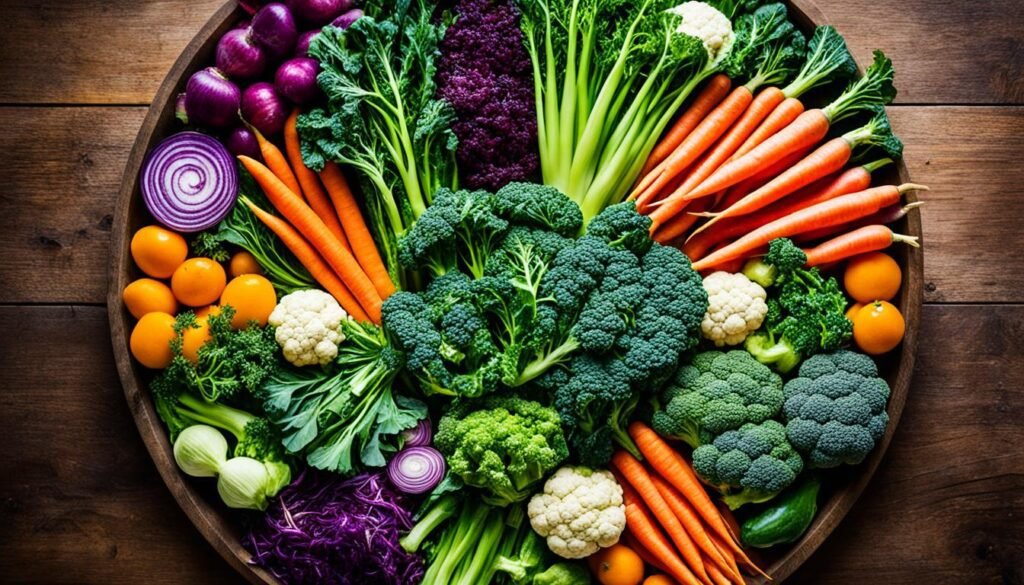
When it comes to promoting healthy, youthful skin, incorporating nutrient-dense vegetables into your diet can make a significant difference. Vegetables are not only low in calories, but they also pack a powerful punch of essential nutrients that support skin health and protect against chronic diseases.
One of the key reasons why vegetables are beneficial for skin health is their rich antioxidant content. Antioxidants help neutralize harmful free radicals in the body, which can contribute to skin aging and damage. By including a variety of vegetables in your meals, you can ensure that you are getting a wide range of antioxidants that benefit your skin.
Furthermore, vegetables are an excellent source of vitamins and minerals that are vital for skin health. For example, vitamin C found in vegetables like bell peppers and broccoli helps stimulate collagen production, promoting firm and youthful skin. Leafy greens such as spinach and kale are abundant in vitamin A, which plays a crucial role in maintaining healthy skin cells.
Additionally, vegetables provide hydration to the skin due to their high water content. Staying adequately hydrated is essential for maintaining skin elasticity and a healthy complexion. Therefore, consuming hydrating vegetables like cucumbers and celery can help improve skin hydration.
To help you understand the benefits of incorporating vegetables into your diet, here is a table showcasing some nutrient-dense vegetables and the key nutrients they provide:
| Vegetable | Key Nutrients |
|---|---|
| Broccoli | Vitamin C, Vitamin K, Antioxidants, Fiber |
| Bell Peppers | Vitamin C, Antioxidants, Anti-inflammatory properties |
| Spinach | Vitamin A, Vitamin C, Vitamin E, Vitamin K, Antioxidants |
| Cucumbers | Hydration, Vitamin K, Antioxidants |
Incorporating a variety of colorful vegetables into your meals ensures that you are getting a diverse range of beneficial nutrients that support your overall health and skin. From leafy greens to vibrant peppers, each vegetable contributes its unique set of vitamins and minerals to promote youthful-looking skin.
Remember, a diet rich in nutrient-dense vegetables not only benefits your skin but also contributes to your overall well-being. So, make it a point to prioritize vegetables in your daily meals and enjoy the rewards of vibrant, healthy skin.
The Power of Flax Seeds for Skin Nutrition
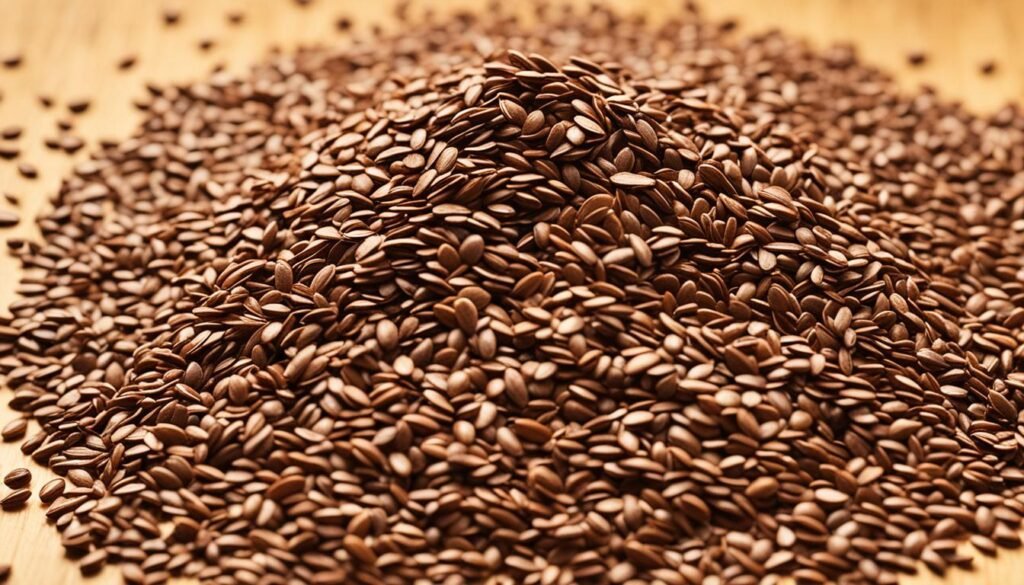
Flax seeds are nature’s gift for promoting skin health and nourishment. These tiny powerhouses are packed with antioxidants and omega-3 fatty acids, making them a valuable addition to your diet. By including flax seeds in your daily routine, you can provide essential nutrients that support a healthy skin membrane and combat free radical damage.
Antioxidants: Flax seeds are rich in antioxidants, which play a vital role in protecting your skin from oxidative stress. These powerful compounds help neutralize free radicals, preventing them from causing damage to your skin cells. By reducing oxidative stress, antioxidants contribute to maintaining the health and vitality of your skin.
Omega-3 Fatty Acids: Flax seeds are one of the best plant-based sources of omega-3 fatty acids. These essential fats are crucial for maintaining a healthy skin barrier, which helps lock in moisture and keep your skin hydrated. Additionally, omega-3 fatty acids have anti-inflammatory properties that can calm irritation and promote overall skin health.
Incorporating flax seeds into your diet is simple and versatile. You can sprinkle ground flax seeds on your cereal, yogurt, or salads, or add them to smoothies and baked goods for a nutritional boost. Just a small amount of flax seeds daily can contribute to your skin’s overall well-being.
To reap the maximum benefits of flax seeds, it’s best to consume them in ground form. Grinding flax seeds enhances their digestibility and ensures your body can absorb their nutrients optimally.
| Benefits of Flax Seeds for Skin Nutrition | |
|---|---|
| 1. Rich in antioxidants to combat free radicals | |
| 2. Excellent source of omega-3 fatty acids for a healthy skin barrier | |
| 3. Supports skin hydration and moisture retention | |
| 4. Helps reduce skin inflammation | |
| 5. Contributes to overall skin health and vitality |
By incorporating flax seeds into your diet, you can harness their powerful nutrition to support your skin’s well-being. Make flax seeds a part of your everyday routine and experience the transformative benefits they can bring to your skin health.
The Benefits of Pomegranates for Skin Protection
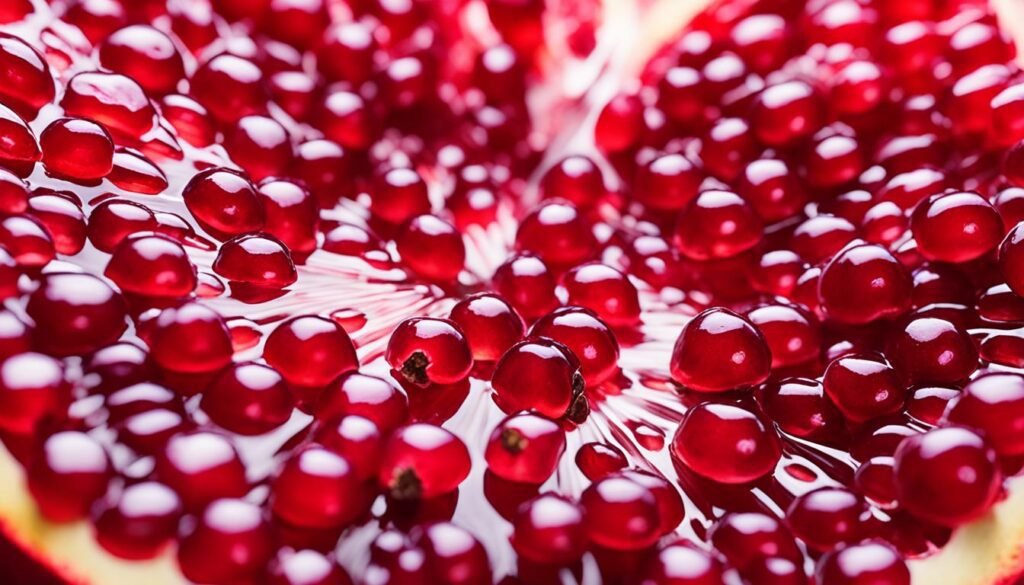
Pomegranates are a delicious and nutritious fruit that can do wonders for your skin. These vibrant fruits are packed with antioxidants, which are essential for protecting the skin from free radicals and reducing the effects of sun damage. Including pomegranates in your diet can provide a quick and easy way to boost your antioxidant intake and support your skin’s health.
Pomegranates have been shown to have several benefits for the skin, including:
- Protection against sun-related damage: The antioxidants in pomegranates help shield the skin from harmful UV rays, reducing the risk of sunburn and skin cancer.
- Reduction in UV skin damage: Studies have found that pomegranate extract can help reduce the signs of UV-induced skin damage, such as redness and inflammation.
- Promotion of collagen production: Collagen is a protein that keeps the skin firm and elastic. Pomegranates contain compounds that can stimulate collagen synthesis, leading to smoother and more youthful-looking skin.
Not only are pomegranates beneficial for your skin, but they also offer a delicious and refreshing flavor. You can enjoy them on their own, add them to salads, or even use them to make a vibrant and healthy pomegranate smoothie.
Including pomegranates in your diet can provide a wide range of nutrients and antioxidants that promote skin health and protection. So why not add these superfruits to your grocery list and start reaping the benefits for your skin?
| Nutrient | Amount per 100g |
|---|---|
| Calories | 83 |
| Carbohydrates | 19g |
| Fiber | 4g |
| Protein | 1.7g |
| Fat | 1.2g |
| Vitamin C | 17% |
| Vitamin K | 16% |
| Potassium | 9% |
| Antioxidants | High |
The Role of Avocados in Skin Health
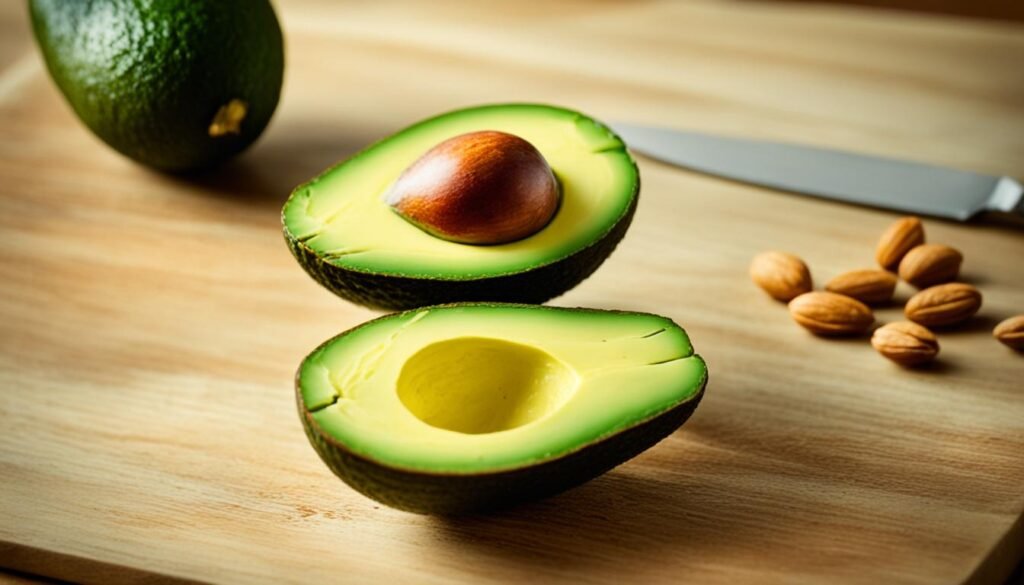
Avocados play a critical role in promoting healthy and vibrant skin. They are a rich source of heart-healthy fats, fiber, and essential nutrients that are essential for maintaining optimal skin health. Incorporating avocados into your diet can provide numerous benefits for your skin.
- Hydration: Avocados are packed with healthy fats that help keep your skin hydrated. Adequate hydration is crucial for maintaining supple and youthful-looking skin.
- Healthy Skin Barrier: The healthy fats found in avocados help promote a healthy skin barrier. This barrier acts as a protective shield, preventing moisture loss and shielding your skin from environmental stressors.
- Antioxidant Power: Avocados contain antioxidants, such as vitamins C and E, that help combat free radicals and oxidative stress, which can contribute to skin aging. These antioxidants work to neutralize harmful compounds and protect the skin’s cells from damage.
- Essential Nutrients: Avocados are a good source of essential nutrients that support overall skin health. They contain vitamins A, C, and E, which play a vital role in maintaining a healthy complexion.
By including avocados in your diet, you can provide your skin with the necessary nutrients to stay healthy and youthful-looking. Whether it’s adding slices of avocado to salads, making guacamole, or incorporating avocado oil into your cooking, there are plenty of delicious ways to enjoy the benefits of avocados.
Avocado and Spinach Salad Recipe
For a refreshing and nourishing salad that promotes skin health, try this simple avocado and spinach salad:
| Ingredients | Instructions |
|---|---|
|
|
By incorporating avocados into your diet and trying out delicious recipes like the avocado and spinach salad, you can experience the numerous benefits that avocados offer for skin health. Start enjoying the nourishing properties of avocados today and see the positive impact it has on your skin!
The Benefits of Healthy Fats for Skin Aging
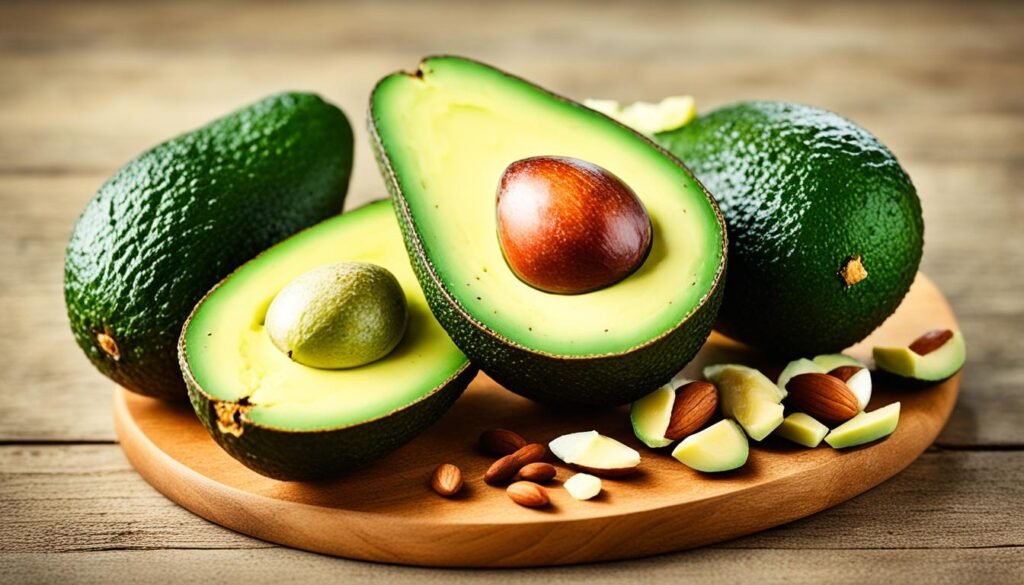
When it comes to maintaining youthful-looking skin, healthy fats are essential. These fats, found in fatty fish and avocados, play a crucial role in supporting skin health and combating the aging process.
One of the key components of healthy fats is omega-3 fatty acids. These fatty acids are known for their ability to promote a healthy skin barrier, reduce inflammation, and stimulate collagen production. By incorporating omega-3 rich foods into your diet, you can improve the overall health and appearance of your skin.
Fatty fish, such as salmon and trout, are excellent sources of omega-3 fatty acids. These fish not only provide the skin with essential nutrients but also support its natural defenses. Including fatty fish in your diet at least twice a week can have a positive impact on your skin’s elasticity, hydration, and overall health.
Avocados are another fantastic food for nourishing your skin from within. Rich in heart-healthy fats, fiber, and important nutrients, avocados can help keep your skin hydrated and promote a healthy skin barrier. Their skin-loving properties make them a fantastic addition to any skincare routine.
Additionally, avocados provide other beneficial nutrients such as vitamins E and C, which are known for their antioxidant properties. These antioxidants help protect the skin from damage caused by free radicals, environmental stressors, and the aging process.
By incorporating healthy fats from fatty fish and avocados into your diet, you can improve your skin’s overall health and appearance. These nutritious foods provide essential nutrients, support a healthy skin barrier, reduce inflammation, and stimulate collagen production. As a result, your skin will look more youthful, hydrated, and radiant.
Summary Table: Benefits of Healthy Fats for Skin Aging
| Healthy Fats | Benefits |
|---|---|
| Fatty Fish (Salmon, Trout) |
|
| Avocados |
|
Conclusion
Nourishing your skin from within with a natural diet that includes nutrient-dense foods can help support healthy and youthful-looking skin. By incorporating foods rich in antioxidants, healthy fats, and essential nutrients into your diet, you can protect your skin against aging, reduce inflammation, and promote overall health.
While it’s important to note that no food can magically reverse wrinkles or other signs of aging, a balanced and nutritious diet can play a significant role in supporting the health of your skin as you age. By ensuring you consume a variety of fruits, vegetables, healthy fats, and other skin-boosting foods, you can provide your body with the necessary tools for optimal skin health.
However, it’s always advisable to consult with a healthcare professional before making any significant changes to your diet. They can provide personalized guidance based on your specific needs and help you make informed choices that are best for your overall well-being.
In conclusion, by prioritizing a natural diet that focuses on nourishing your skin from within, you can support healthy and resilient skin as you age. Remember, true beauty comes from within, and a nutrient-rich diet is one of the most valuable investments you can make for your skin and overall health.
FAQ
What are some natural diet remedies for skin aging?
Some natural diet remedies for skin aging include consuming foods rich in antioxidants, healthy fats, and essential nutrients. These foods can support skin health, protect against oxidative stress, and promote overall well-being.
What vegetables can help promote youthful skin?
Vegetables such as broccoli, red bell pepper, spinach, and sweet potatoes are packed with essential nutrients, antioxidants, and vitamins that can nourish your body and help promote healthy and youthful skin.
Which fruits are beneficial for skin aging?
Fruits like avocado, blueberries, papaya, and pomegranate seeds are packed with antioxidants, vitamins, and minerals that can benefit skin health and slow down the aging process.
How do healthy fats contribute to skin health?
Healthy fats, such as those found in extra virgin olive oil, fatty fish like salmon, flax seeds, and avocados, are essential for skin health and overall well-being.
What are the antioxidant benefits of green tea?
Green tea is high in antioxidants, particularly polyphenols like epigallocatechin gallate (EGCG), which help fight free radicals and protect against sun damage.
How does dark chocolate benefit skin health?
Dark chocolate is rich in polyphenols, antioxidants that help fight free radicals in the body. Flavanols found in dark chocolate may improve skin elasticity and reduce facial wrinkles.
Why are vegetables important for youthful skin?
Vegetables are highly nutrient-dense and low in calories, making them excellent choices for promoting healthy skin. They are rich in antioxidants, vitamins, and minerals that can protect against chronic diseases and support skin health.
What is the power of flax seeds for skin nutrition?
Flax seeds are packed with antioxidants and omega-3 fatty acids that support a healthy skin membrane and fight free radicals. Including flax seeds in your diet can provide essential nutrients for skin health and hydration.
How do pomegranates benefit skin protection?
Pomegranates are rich in antioxidants and have been shown to protect the skin from sun-related damage, reduce UV skin damage, and promote collagen production.
How do avocados contribute to skin health?
Avocados are full of heart-healthy fats, fiber, and essential nutrients that support skin health. The healthy fats in avocados help keep the skin hydrated and promote a healthy skin barrier.
What is the importance of healthy fats for skin aging?
Healthy fats, such as those found in fatty fish and avocados, play a crucial role in maintaining youthful-looking skin. Omega-3 fatty acids support a healthy skin barrier, decrease inflammation, and promote collagen production.
How can a natural diet support healthy and youthful-looking skin?
Nourishing your skin from within with a natural diet that includes nutrient-dense foods can help support healthy and youthful-looking skin. Foods rich in antioxidants, healthy fats, and essential nutrients can protect against skin aging, reduce inflammation, and promote overall health.
Should I consult with a healthcare professional before changing my diet?
Yes, it is important to consult with a healthcare professional before making any significant changes to your diet to ensure it aligns with your individual needs and health goals.

